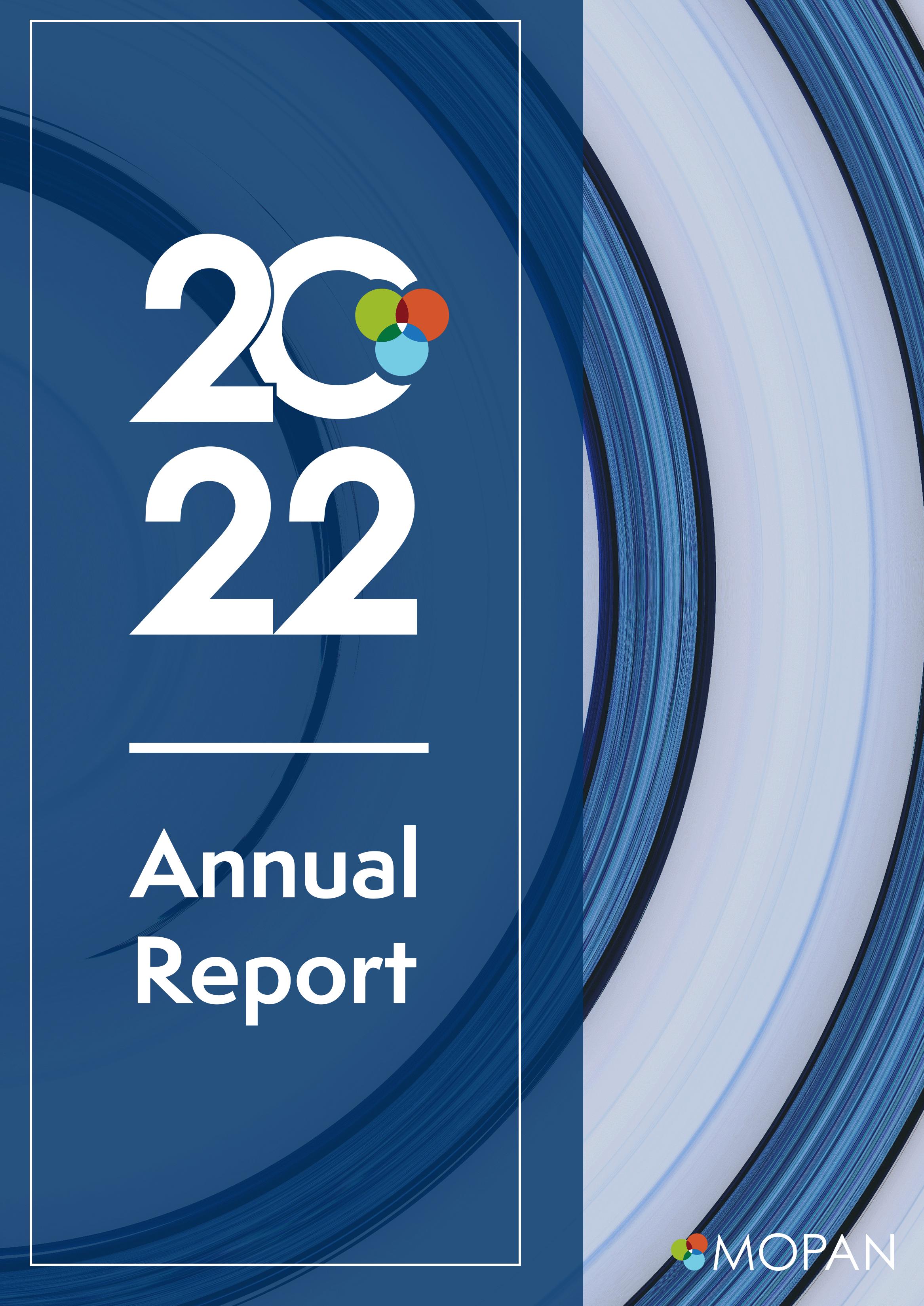

2 Annual Report 2022 3
MOPAN 2022 Annual Report
MOPAN Steering Committee members attend 2022 Autumn Steering Committee, Paris, 20 October 2022.
© MOPAN
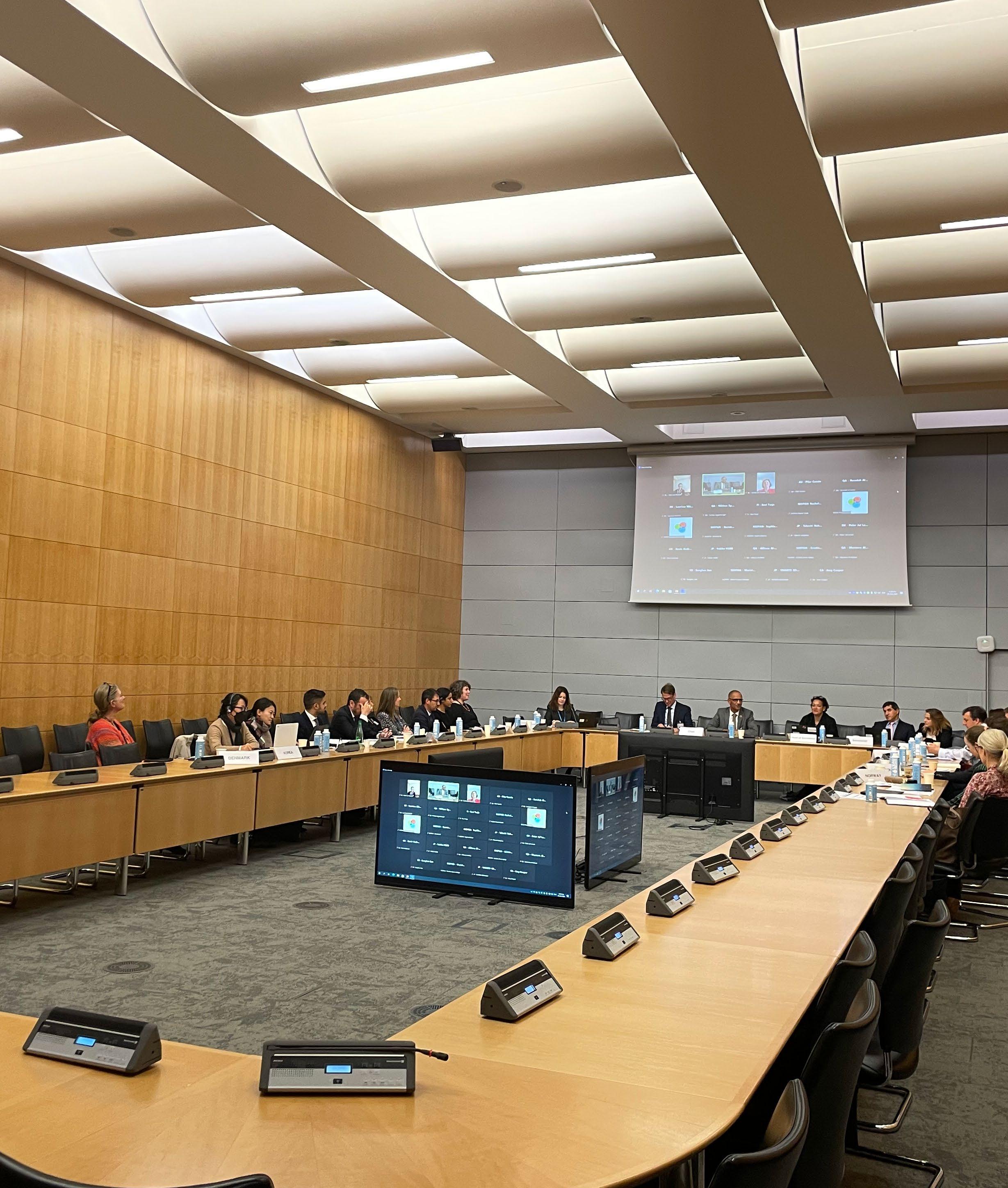
This report is published under the responsibility of the Multilateral Organisation Performance Assessment Network (MOPAN) and the overall strategic guidance of Suzanne Steensen, Head of the MOPAN Secretariat. MOPAN is governed by a Steering Committee composed of representatives of all of its member countries. MOPAN is serviced by a permanent Secretariat hosted at the Organisation for Economic Co-operation and Development (OECD) and bound by its administrative rules. However, it remains fully independent in implementing the programme of work decided by the Steering Committee.
This document, as well as any data and any map included herein, are without prejudice to the status of or sovereignty over any territory, to the delimitation of international frontiers and boundaries and to the name of any territory, city or area.
Please cite this publication as: Multilateral Organisation Performance Assessment Network MOPAN (2023), 2022 MOPAN Annual Report, Paris, https://www.mopanonline.org/aboutus/annualreports/
Photos:
© Adobe Stock | Cover, 2, 6, 44
© MOPAN | 4, 12 , 18, 24, 26, 28, 31, 34, 39
© Sven de Almeida | 16, 17
© Freepik | Flags | 14, 23
Annual Report 2022 5

Annual Report 2022 Annual Report 2022 Foreword 8 Letter from the Chair 10 The Multilateral Performance Network 13 MOPAN: The global reference point for performance in the multilateral system 14 Celebrating 20 years of MOPAN 16 Delivering performance evidence for the multilateral system 19 2022 Milestones 20 MOPAN’s findings across the multilateral system 22 MOPAN after 20 29 Strategic renewal 30 MOPAN 4.0 32 Guiding the MOPAN Network 35 Network governance 36 Membership 38 Annexes 39 Annex A: Finances 40 Annex B: MOPAN assessments 2003-2023 42 7 6
Contents
Foreword
MOPAN has a pivotal role to play in building trust and pushing for an inclusive, transparent and high performing multilateral system.
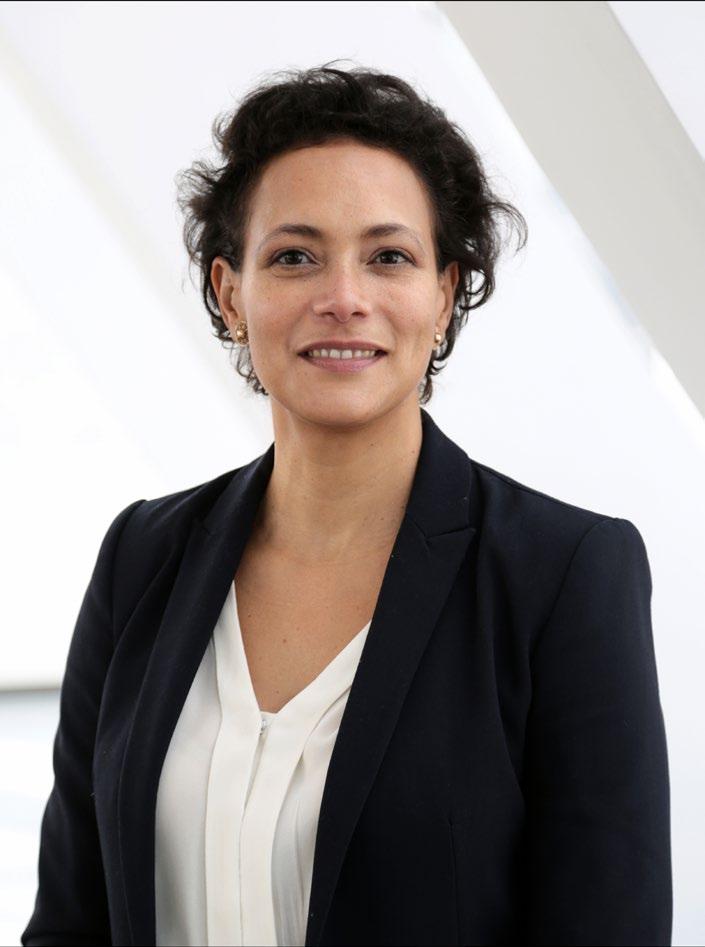
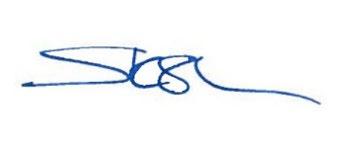
2022 was a milestone for the MOPAN Network. We celebrated 20 years of achievements and looked to our next 20 years with anticipation.
Over the years, MOPAN has become the global reference for external independent information on the performance of the many organisations comprising the multilateral system. Our membership has grown from eight to 21 countries. Those joining MOPAN do so because they are strongly committed to a multilateral system with effective institutions that deliver good solutions and sustainable results to ensure a more inclusive, just, and peaceful future for all. This commitment is demonstrated by our members’ annual investment of USD 70 billion in multilateral institutions.
Over MOPAN’s 20-year history, the Network has carried out 99 organisational assessments that provide organisations with evidence about their performance and to ensure that they are fit-for- purpose. To respond to pressing global issues, MOPAN’s approach to assessment has evolved while remaining rigorous, permitting us to capture the operational context and business model of the organisations.
As trust in institutions has been challenged and global crises demand global solutions, MOPAN’s assessments offer powerful accountability and learning tools. They contribute to building trust in multilateral institutions by providing whole-of-organisation insights to improve performance and inform dialogue between organisations and their member states.
In the coming biennium, MOPAN will embark on an ambitious work programme. We will undertake 14 new assessments of organisations that are confronting today’s most pressing global challenges. The Network will also be renewing its strategic vision and strategy at the same time to undertake its own transformation.
As MOPAN looks to the next 20 years, we will build upon our strong foundation of delivering objective, relevant evidence and learning for better performance. However, incremental progress cannot meet today’s pressing challenges nor can it satisfy the expectations of an inclusive, transparent, and sound multilateral system. Our transformation will therefore entail several priorities.
¨ Acknowledging that the multilateral system is extremely diverse and that member states work in different ways to meet a common goal of improving livelihoods and creating resilient societies. By trusting our multilateral partners to build from their strengths, we can expect that the resulting outcomes become more than merely the sum of their parts.
¨ This can only be done by providing informed, meaningful, and objective evidence. We will continue to work with key stakeholders to help strengthen our performance standards, promote good practices, and support organisational learning across organisations.
¨ Lastly, the MOPAN Network will use its common voice and investments to work in partnership with multilateral organisations by supporting good practices and reform where needed to make even better able to meet the challenges of today and tomorrow.
I am really excited by what the future holds for MOPAN. We will continue to maintain high standards and push for real improvements and better results.
I hope you will join us in these efforts.
Annual Report 2022 Foreword
9 8
Suzanne Steensen
Head of the MOPAN Secretariat
Letter from the Chair
As 2022 comes to an end, I want to reflect on the success of the past twelve months and look ahead to the exciting opportunities for MOPAN.
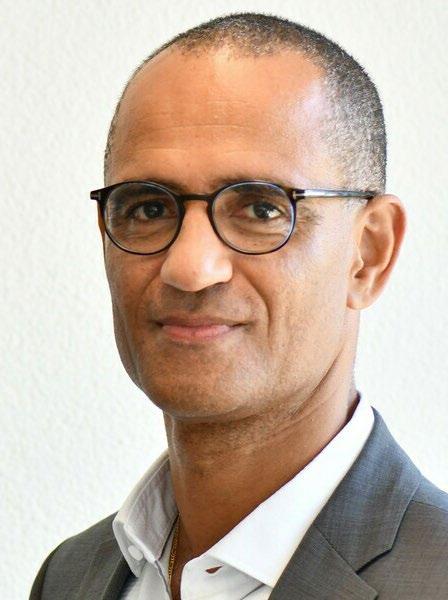
As 2022 comes to an end, I want to reflect on the success of the past twelve months and look ahead to the exciting opportunities for MOPAN.
The year started with the multilateral system being placed under further stress following Russia’s military aggression against Ukraine. With official development assistance budgets under increasing pressure, it is critically important that the multilateral system is effective and improves its performance - making it stronger, better, and smarter.
Members agreed that MOPAN has a key role in achieving this goal. This is reflected by members’ strong and unanimous support for extending the Memorandum of Understanding between the OECD and MOPAN for 2023-24 alongside the Network Response to the MOPAN External Evaluation, which highlights how MOPAN has largely delivered on its reform agenda, leading to “[an] increased quality of MOPAN’s products and their credibility”, supported by efforts to improve learning and uptake.
Other highlights in 2022 include the launch of our Lessons in Multilateral Effectiveness on COVID-19 and our reflections on rethinking effective humanitarian organisations, which provide important insights about the multilateral system’s response to these critical issues. In addition, MOPAN has continued to strengthen its analysis on sexual exploitation, abuse and harassment, such as the recent Brief regarding the emerging performance patterns of six UN organisations in preventing sexual exploitation, abuse and sexual harassment (PSEAH).
I was delighted that Switzerland could conclude its Chairmanship by celebrating MOPAN’s 20th Anniversary at the December High-Level Event, led by President Ignazio Cassis. Alongside the Heads of Agencies and senior member representatives, it was great to witness the Network’s convening power in action. And as President Cassis said, in a changing world with a multilateral system in need of reform, MOPAN is needed now more than ever.
This year has also been important for Switzerland as we marked our twenty years of membership of the United Nations with our election to the United Nations Security Council for the first time. This means that MOPAN and Switzerland can look ahead to 2023 with optimism.
The work of the Strategy Group, endorsed by the MOPAN Steering Committee, will be integral to members agreeing on the Network’s medium-term strategic vision and future direction, for which members will be kept informed via a transparent and inclusive process.
Therefore, in concluding, I would like to say how 2022 has strengthened my belief in the multilateral system and the necessity to seek global solutions to global challenges. MOPAN plays an important role in this regard, which is why Switzerland has provided an additional voluntary contribution to support the Network and I look forward to MOPAN strengthening its activities going forward.
Ambassador Christian Frutiger
2022 MOPAN Chair
Assistant Director General, Head of Global Cooperation Swiss Agency for Development and Cooperation (SDC), Federal Department of Foreign Affairs (FDFA), Switzerland
MOPAN continued to focus on delivery, implementing the core work of our institutional performance assessments. Alongside the launch of the Global Fund report ahead of its replenishment, 14 assessments are currently ongoing, including the focus on international finance insitutions (AfDB, IDB, IDB Invest, IDAIBRD, IFC and EBRD) and other organisations (GAVI, GPE, IFAD, IOM, UNAIDS, UNHCR, UNRWA and WHO). I look forward to their successful completion in the near future.
It has been an honour to serve as the MOPAN Chair, and I look forward to Italy’s 2023 Chairmanship under the guidance of Minister Plenipotentiary and Deputy Director General, Ms. Laura Aghilarre.
For a final point, I would like to thank my Swiss colleagues for their support during this year, and the Head of Secretariat, Suzanne Steensen, and her team who have gone above and beyond in their efforts.
Annual Report 2022 Letter from the Chair
11 10
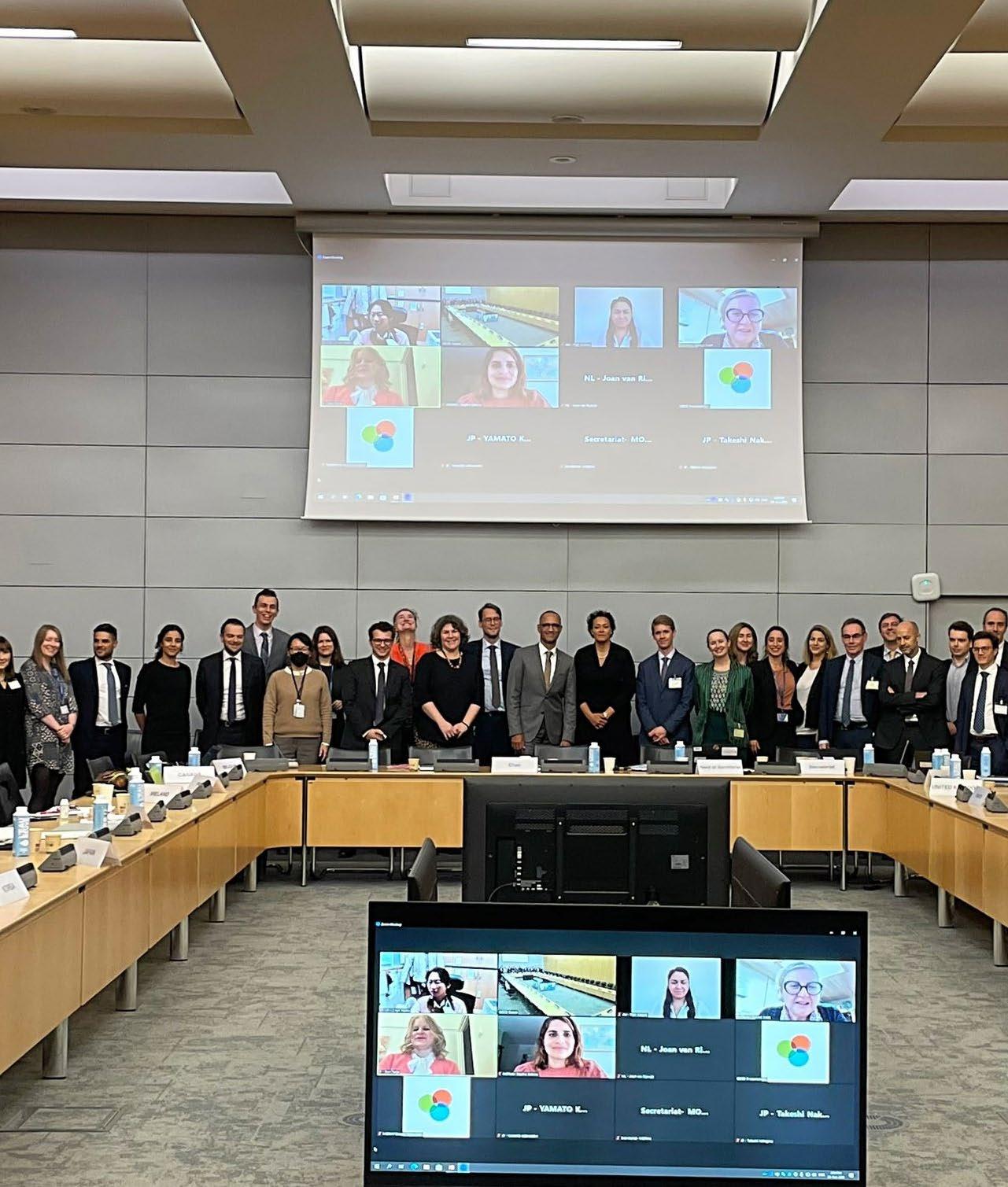
The Multilateral Performance Network
MOPAN Steering Committee members attend 2022 Autumn Steering Committee, Paris, 20 October 2022.
Annual Report 2022 13
© MOPAN
MOPAN: The global reference point for performance in the multilateral system
The Multilateral Performance Network (MOPAN) was established in 2002 to foster trust by ensuring that multilateral organisations that receive funding deliver results, are relevant, and fit-for-purpose. A total of 35 organisations have been assessed over the last 20 years, many of them several times. These organisations include UN agencies, funds and programmes, development banks and international financial institutions, and vertical funds.
In 2022, MOPAN pursued the most diverse programme of work in its history. During the year, the Network undertook 15 institutional assessments of organisations — the broadest range of structures and mandates of any MOPAN assessment batch to date. To ensure that MOPAN’s assessment framework properly reflects the operational contexts of the organisations we assess, our Technical Working Group worked throughout 2022 to provide framework adaptations, particularly to meet the needs of international finance institutions and organisations working in crisis contexts. In conjunction with these assessments, the Network launched three Lessons in Multilateral Effectiveness. These studies analyse cross-cutting themes that emerge from recent assessments and the utility of recent adaptations of the framework.
Members
at 31 December 20221
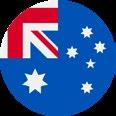

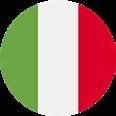


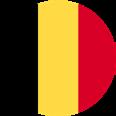

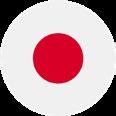
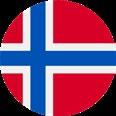
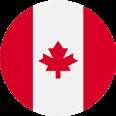

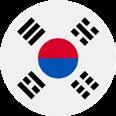
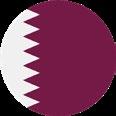

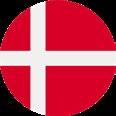




*Türkiye is an observer to the Network.
1 Spain announced its intention to re-join the Network in 2022. Their membership will be made official in 2023.
MOPAN at a glance
Shareholders
7/7 11/20
20/38
G7 members G20 members OECD members
Funding
MOPAN’s membership includes:
¨ All G7 members
¨ Eleven G20 members
¨ Twenty of thirty-eight OECD members
70.6 billion
All MOPAN members are members of the United Nations and shareholders in the major international financial institutions.
Since 2002, MOPAN has conducted 99 institutional assessments across 35 unique organisations within the UN system, international financial institutions, and vertical funds and mechanisms.4
99
35 institutional assessments organisations
90%
Together, MOPAN members contribute USD 70.6 billion annually in official development assistance to the multilateral system, which amounts to 90% of total multilateral funding globally.2, 3
2023-24
27
62% of members total funding organisations
In 2023-24, MOPAN will deliver assessments of 27 organisations.5 These organisations represent 62% of our members’ total funding to the multilateral system. 6
2 Author calculation
3 OECD Creditor Reporting System (CRS), 2021
4 OECD Creditor Reporting System (CRS), 2021
5 No data are available for GPE or ICRC, however these organisations are still counted towards total delivered assessments.
6 OECD Creditor Reporting System (CRS), 2021
Annual Report 2022 The Multilateral Performance Network
15 14 Australia Belgium Canada Luxembourg Netherlands Norway Qatar Sweden Switzerland Denmark Finland Italy Japan Korea France Germany Ireland Türkiye* United Kingdom United States
Celebrating 20 years of MOPAN
Reflecting on multilateralism’s challenges
“We must strive for strong, agile and respected multilateral organizations. We must adapt multilateralism to a changing world.”


President of the Swiss Confederation

Today, the multilateral system is facing pressures unforeseen in 2002 when MOPAN was founded. It is aiming to achieve the goals of the 2030 Agenda amid a myriad crises including the slow recovery from COVID-19, the Russian invasion of Ukraine, and an ongoing food, fuel and fertiliser crisis that is devastating communities in the horn of Africa. In this context, effective partnerships remain critically important. More than ever, a trustworthy multilateral system is needed as the scale of these challenges can only be met by working together. The multilateral system requires trust between the member states that support the system and the organisations that carry out our collective mission to deliver solutions.
This was the backdrop for the celebration of MOPAN’s 20 years. The President of the Swiss Confederation, Ignazio Cassis, convened leaders of multilateral organisations and member states to reflect on the future of the multilateral system and to identify how to collectively to build greater confidence and trust in it.
This anniversary event, “Multilateralism at a Crossroads: Rising to the Challenges of Today and Tomorrow”, addressed how important it is for member states to hold the organisations they fund accountable and to support their efforts to respond to the needs of those they serve. It reiterated the importance of rebuilding trust in the multilateral system. MOPAN members were pointedly encouraged to use their collective voice to have a positive impact on the multilateral system by reflecting on the kinds of finance it requires and how those resources can be best used.
The anniversary event concluded that to be fit-for-the-future, the multilateral system must resolve to integrate previous lessons learned. It must strengthen its commitment to multi-stakeholder approaches to solution-building and focus on the role of good governance. To deliver solutions of the breadth and urgency needed to meet current global challenges, the multilateral system must align its goals and collaborate to strengthen trust.
Multilateralism at a crossroads: Rising to the challenges of today and tomorrow
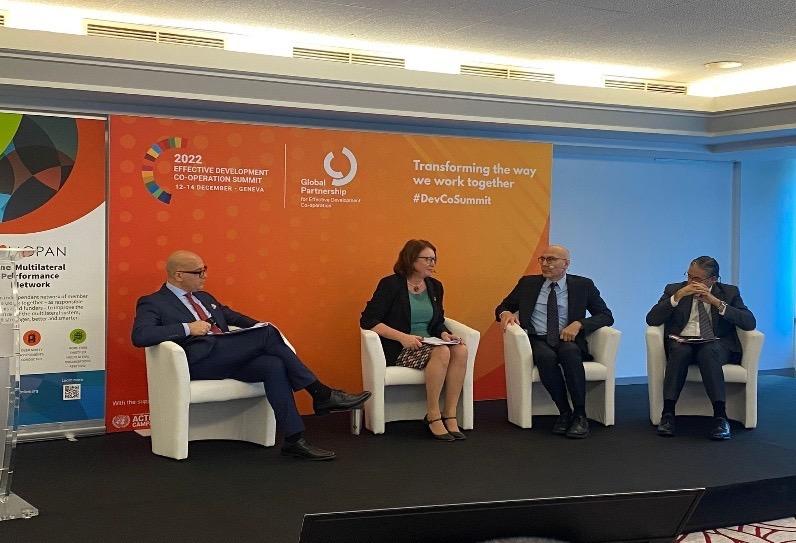
Participants and Panellists
Ignazio Cassis President of the Swiss Confederation
Dr Rania Al-Mashat Minister of International Cooperation, Egypt
Mathias Cormann Secretary-General of the Organisation for Economic Co-operation and Development
Oscar Fernandez-Taranco Assistant Secretary-General for Development Coordination, United Nations Development Coordination Office
Philippe Lazzarini Commissioner of the United Nations Relief and Works Agency for Palestine Refugees in the Near East
Susanna Moorehead Chair of the OECD Development Assistance Committee
Bjørg Sandkjær State Secretary of the Ministry of Foreign Affairs, Norway
Achim Steiner Administrator of the United Nations Development Programme
Michele Sumilas Assistant to the Administrator of the Bureau for Policy, Planning, and Learning, USAID
Volker Türk United Nations High Commissioner for Human Rights
Suzanne Steensen Head of MOPAN Secretariat
Mark Eddo (Moderator) International Broadcaster
Annual Report 2022 The Multilateral Performance Network
Moderator Mark Eddo, and Panel Participants Bjørg Sandkjær, Volker Türk and Oscar Fernandez-Taranco discuss the contemporary challenges facing the multilateral system in 2022 at the MOPAN 20th Anniversary High-Level Event, Geneva,12 December 2022.
17 16
© Sven de Almeida
Ignazio Cassis, President of the Swiss Confederation, delivers the welcome address at the MOPAN 20th Anniversary HighLevel Event, Geneva, 12 December 2022.
© Sven de Almeida
@Ignazio Cassis
The
© MOPAN
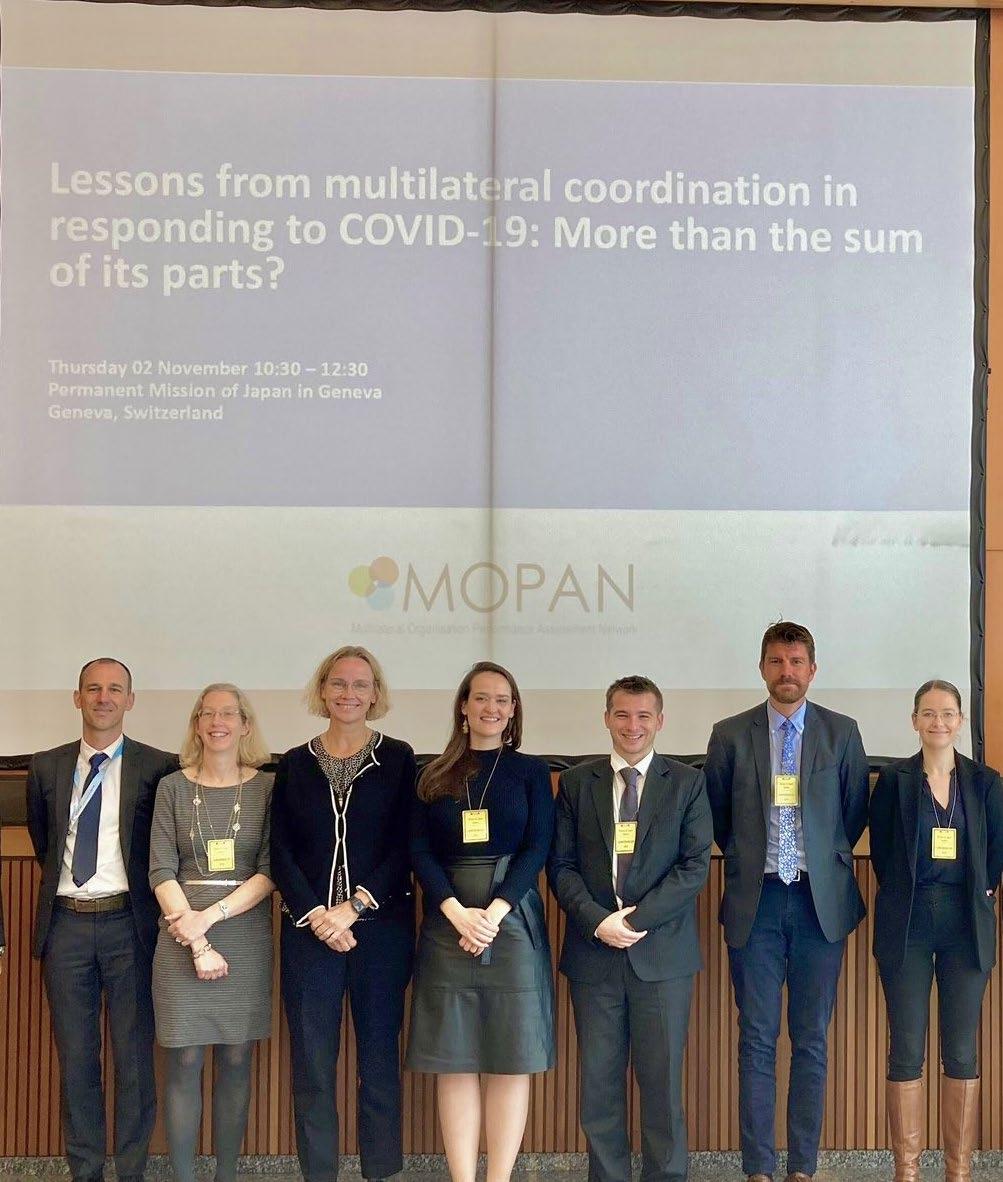
Delivering performance evidence for the multilateral system
Permanent Mission of Japan in Geneva hosts the MOPAN Secretariat to discuss findings of the MOPAN COVID-19 Study, “More Than the Sum of its Parts? The Multilateral Response to COVID-19”, Geneva, 2 November 2022.
Annual Report 2022 19
2022 Milestones
2022 was a pivotal year in MOPAN’s 20-year existence. Convening in Geneva to celebrate MOPAN’s 20 th Anniversary, and to recommit to effective multilateralism strengthened the Network’s collective voice. It increased the quality and impact of MOPAN’s relationships with key multilateral stakeholders, promoting organisational effectiveness in the multilateral system. Membership expanded to include Qatar and Türkiye, and MOPAN started to prepare a new strategic vision and medium-term strategy.
Memorandum of Understanding extends MOPAN’s hosting arrangement at the OECD
Global Fund Assessment release
Launch of Rethinking Effective Humanitarian Organisations at UN ECOSOC Humanitarian Affairs Segment
Qatar joins MOPAN as a member
Türkiye joins MOPAN as an observer
Spring Steering Committee Meeting
Finalisation of the MOPAN Network Response to the MOPAN Evaluation (2015-21)
MOPAN Evaluation (2015-2021) release
Announcement of MOPAN assessments for release in 2023: Gavi, GPE, IFAD, IOM, UNHCR, UNRWA and WHO
Membership MOPAN events
Publications and releases Timeline key
Launch of More than the sum of its parts?: The Multilateral Response to COVID-19 overview at UNGA77 side event; co-hosted by Finland and Switzerland
Autumn Steering Committee Meeting
Launch of Progress on SEAH? From Words to Deeds brief at Geneva Group of Friends to Eliminate Sexual Harassment (GoFESH); collboration with Canada, Costa Rica and Estonia
MOPAN 20th Anniversary Event, “Multilateralism at a Crossroads: Rising to the Challenges of Today and Tomorrow”; convened by Ignazio Cassis, President of the Swiss Confederation
1st MOPAN Strategy Group meeting
January March
April
May
June July
August
September October
November
December
Annual Report 2022 Delivering performance evidence
21 20
MOPAN’s findings across the multilateral system
Growing global challenges and local development needs have led to greater scrutiny of multilateral organisations which are expected to perform better to satisfy heightened expectations of their performance.
The MOPAN Steering Committee nominates and endorses the selection of the MOPAN assessments carried out by the MOPAN Secretariat to provide evidence of performance and propose directions for improvement. Assessments of multilateral organisations are designed to be helpful to members by providing detailed information and evidence about a broad spectrum of factors that influence an organisation’s performance.
The rigor and the substance of assessment evidence is ensured by the MOPAN methodology and its seven-stage process, or life cycle, i) preparation, ii) inception, iii) evidence survey and data collection, iv) analysis and preliminary findings, v) reporting, vi) launch and dissemination, and) vii management response.
Organisational performance
The MOPAN assessment life cycle Organisation Institutional Lead(s) Assessment progress*













































Annual Report 2022 Delivering performance evidence
PREPARATION INCEPTION EVIDENCE: SURVEY & DATA COLLECTION ANALYSIS & PRELIMINARY FINDNGS LAUNCH & DISSEMINATION
CYCLE REPORTING MANAGEMENT RESPONSE
ASSESSMENT LIFE
IDA/IBRD
IFAD ILO IOM OCHA UNAIDS UNDP UNEP UNHCR UNICEF UNOPS UNRWA WHO
AfDB EBRD GAVI Global Fund GPE
IDB IDB Invest IFC
MOPAN institutional assessments
23 22 *as at 31 December 2022.
Source: MOPAN
Performance insights
MOPAN generates performance information to respond to the needs of members not only through its assessments, but also in studies on crucial areas of multilateral co-operation. The areas of investigation and performance insights in 2022 are presented below.
Rethinking effective humanitarian organisations
The headline findings from the MOPAN analysis of effective humanitarian organisations, Rethinking Effective Humanitarian Organisations, have major implications for how MOPAN assesses the performance of organisations working in high-risk, fast-evolving crisis contexts.
¨ Humanitarian reform commitments are not enough, unless organisations hardwire them into their organisational structures and business models.
¨ MOPAN’s standard organisational assessment framework needs to be adapted to better reflect the nature of humanitarian operations and the practical requirements of working in crises situations.

Launched at the Humanitarian Affairs Segment of the United Nations Economic and Social Council, this study provided MOPAN with a mandate, with the help of a multistakeholder humanitarian advisory group, of adapting its framework to the conditions of organisations working in crises. The adapted framework was successfully piloted on the assessment of the International Organisation for Migration in 2022.
“MOPAN has served as a catalyst for our management reforms, and recommendations have been shared with multilateral system to highlight critical areas that deserve support. Without the support of multilateral system we will not succeed.”
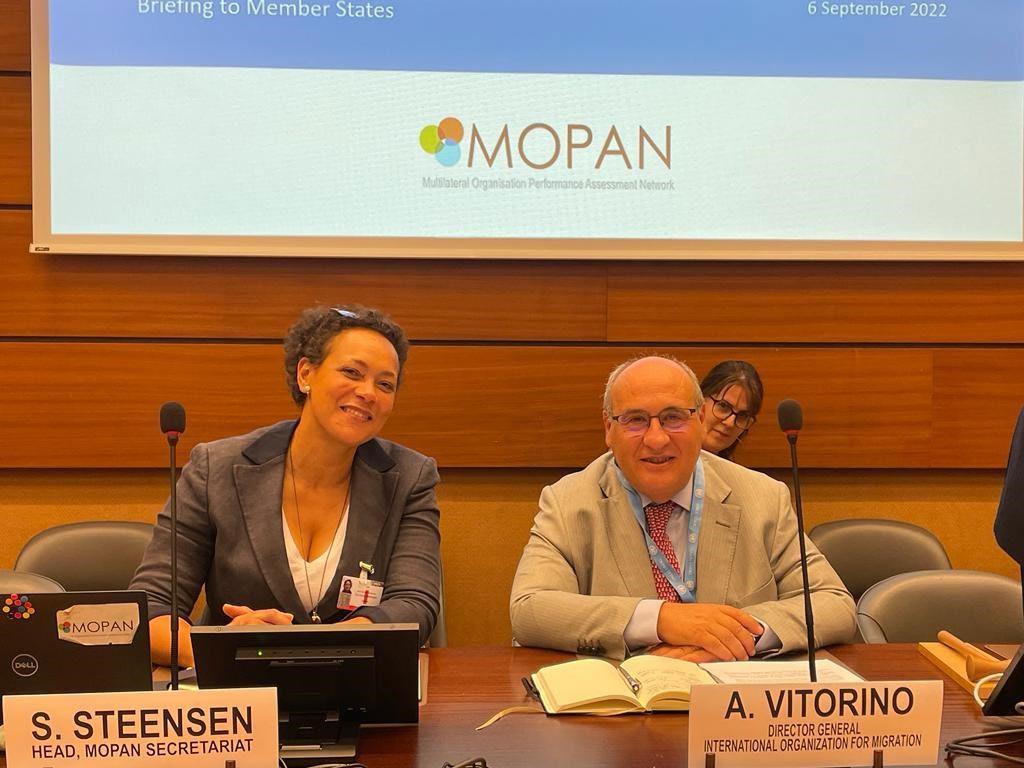
– Antonio Vitorino, Director-General IOM Antonio Vitorino, Director-General of the International Organization for Migration (IOM) meets with Suzanne Steensen, Head of MOPAN Secretariat for a briefing to member states on the ongoing assessment of the IOM, Geneva, 6 September 2022.
© MOPAN
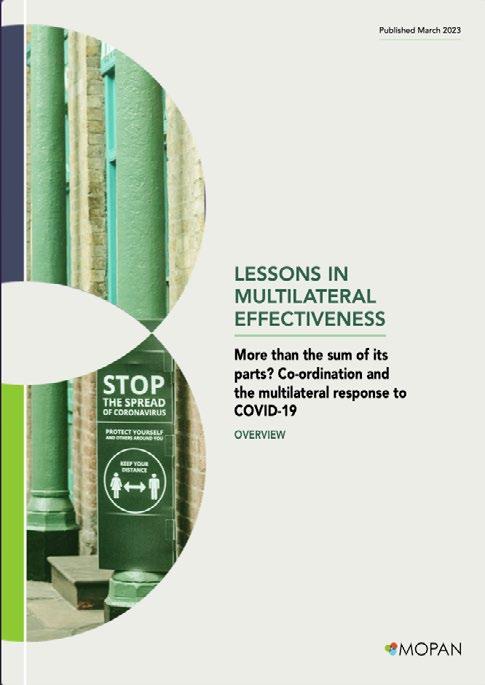
The multilateral response to COVID-19
As COVID-19 progressed from an outbreak to a pandemic, its severe, complex and intertwined impacts became far-reaching and most severe for vulnerable groups. Years of progress towards sustainable and inclusive development have been reversed. Recognising the unprecedented nature of the COVID-19 crisis, the multilateral system made early and widespread calls for cohesive global action.
The MOPAN study, More than the sum of its parts? The multilateral response to COVID-19, concluded with five lessons for “Building Back Better” and the multilateral response to future crises:
1. The ability to scale-up an existing co-ordination mechanism holds advantages for policy and operational coherence in responding to complex challenges.
2. Whereas co-ordination among UN Entities, multilateral development banks, and the International Monetary Fund was scaled-up to respond to the pandemic, important barriers limit the extent of joint planning and programming.
3. Fragmentation in resource mobilisation contributes to competition among multilateral organisations, works against joint programming and undermines the achievement of collective outcomes.
4. Beyond policy coherence at the global level, effective multilateral co-ordination involves building national ownership striking a balance between global goals and national needs and priorities in decision making.
5. Delivering an equitable response to global emergencies requires not only leadership and engagement among organisations, but a “whole of society” approach.
The study was launched during a side event at the 77th United Nations General Assembly, co-hosted by H.E. Ms. Miia Raine of Finland and H.E. Ms. Riccarda Chanda of Switzerland. Speakers included senior leaders of six different multilateral organisations – Gavi, International Monetary Fund, World Health Organisation, World Bank, and UNICEF, in addition to the United Nations Development Coordination Office. This study was also presented to the Geneva Group, a group of leading donors to the UN system, hosted by the Permanent Mission of Japan to the International Organisations in Geneva.
In the face of pandemics, authoritarianism, and unjustified wars, MOPAN helps multilateral stakeholders work together to deliver on shared goals.
– Michele Sumilas, Assistant to the Administrator of the Bureau for Policy, Planning and Learning, USAID (MOPAN 20th anniversary high-level event)
Annual Report 2022 Delivering performance evidence
25 24

Progress on preventing sexual misconduct
Since 2020, MOPAN has been assessing how well organisations establish and enforce policies to protect against sexual exploitation, abuse and harassment (SEAH). In December, MOPAN published a policy brief that outlines how far six UN agencies, which had been recently assessed by MOPAN, have come in addressing SEAH, and identifies good practices to address the remaining shortfalls in their prevention practices:
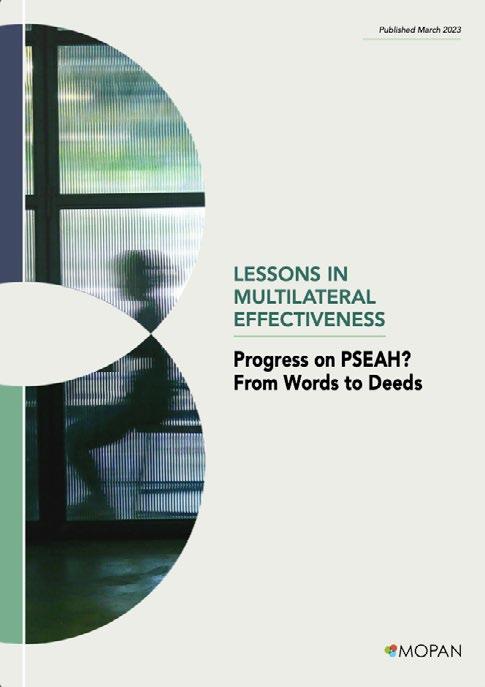
¨ Policies and codes of conduct are now largely in place in many of the assessed agencies, with organisations rolling them out through training and awareness-raising ¨ The quantity of allegations of sexual exploitation and abuse are now reported transparently and publicly to the UN Secretary-General
¨ However, many organisations still choose to keep reporting on cases of sexual harassment and how they were resolved internally
¨ Organisations face a lack of resources for preventing SEAH, including insufficient structures dedicated to preventing sexual misconduct, and have yet to find effective ways to hold implementing partners accountable
¨ Organisations do not co-ordinate well-enough with other agencies – particularly in field offices
¨ Organisations do very little to track the implementation of policies to prevent sexual misconduct, and do little to centre their responses around survivors.
In December, the policy brief was launched to the Geneva Group of Friends to Eliminate Sexual Harassment (GoFESH) that includes over 40 UN member states and over half of MOPAN’s members. The event was hosted by the Permanent Mission of Canada to the United Nations in Geneva, the Permanent Mission of Estonia to the United Nations in Geneva and the Costa Rica Ministry of Foreign Affairs. Over the 2023-24 period, MOPAN will continue to engage with GoFESH, and the UN Special Coordinator for SEAH and MOPAN will ensure that progress on SEAH is fully integrated into all MOPAN assessments.

MOPAN Assessment of the Global Fund
The Global Fund continues to evolve in a dynamic global health landscape. Founded 20 years ago, the Global Fund has constantly sought to improve its performance and to evolve while at the same time remaining focused on its core mandate to fight HIV/AIDS, tuberculosis, and malaria, the world’s three major devastating infectious diseases : AIDS, tuberculosis and malaria.
The MOPAN Assessment of The Global Fund finds that:
¨ The Global Fund’s flexible and evolving operational approach is continually reviewed and allows for a nimble response. This has been particularly important during the COVID-19 pandemic
¨ With its inclusive partnerships, the Global Fund demonstrates a strong commitment to all involved stakeholders and promotes buy-in
¨ A resolute focus on the three diseases has allowed the Global Fund to achieve robust results and make continued progress despite short-, medium- and longterm challenges
¨ At the same time, the Global Fund can make more progress in addressing crosscutting issues such as building resilient and sustainable systems for health (RSSH), gender and human rights, and environment and climate change
¨ A cohesive and fully independent evaluative function will be important for moving from simple monitoring to more in-depth learning and understanding from its supported programmes
¨ Finally, country ownership and competing stakeholder priorities will be an important part of discussions in the years ahead.
The Global Fund values the results of the assessment and appreciates the constructive consultations that took place throughout the evaluation process. –
Global Fund Management response to the 2022 MOPAN Assessment of The Global Fund
Annual Report 2022 Delivering performance evidence
27 26
Head of Secretariat, Suzanne Steensen, presents findings from MOPAN’s study on the prevention of sexual exploitation and harassment (PSEAH) study to Geneva Group of Friends to Eliminate Sexual Harassment (GoFESH) Members, Geneva, 8 December 2022.
© MOPAN
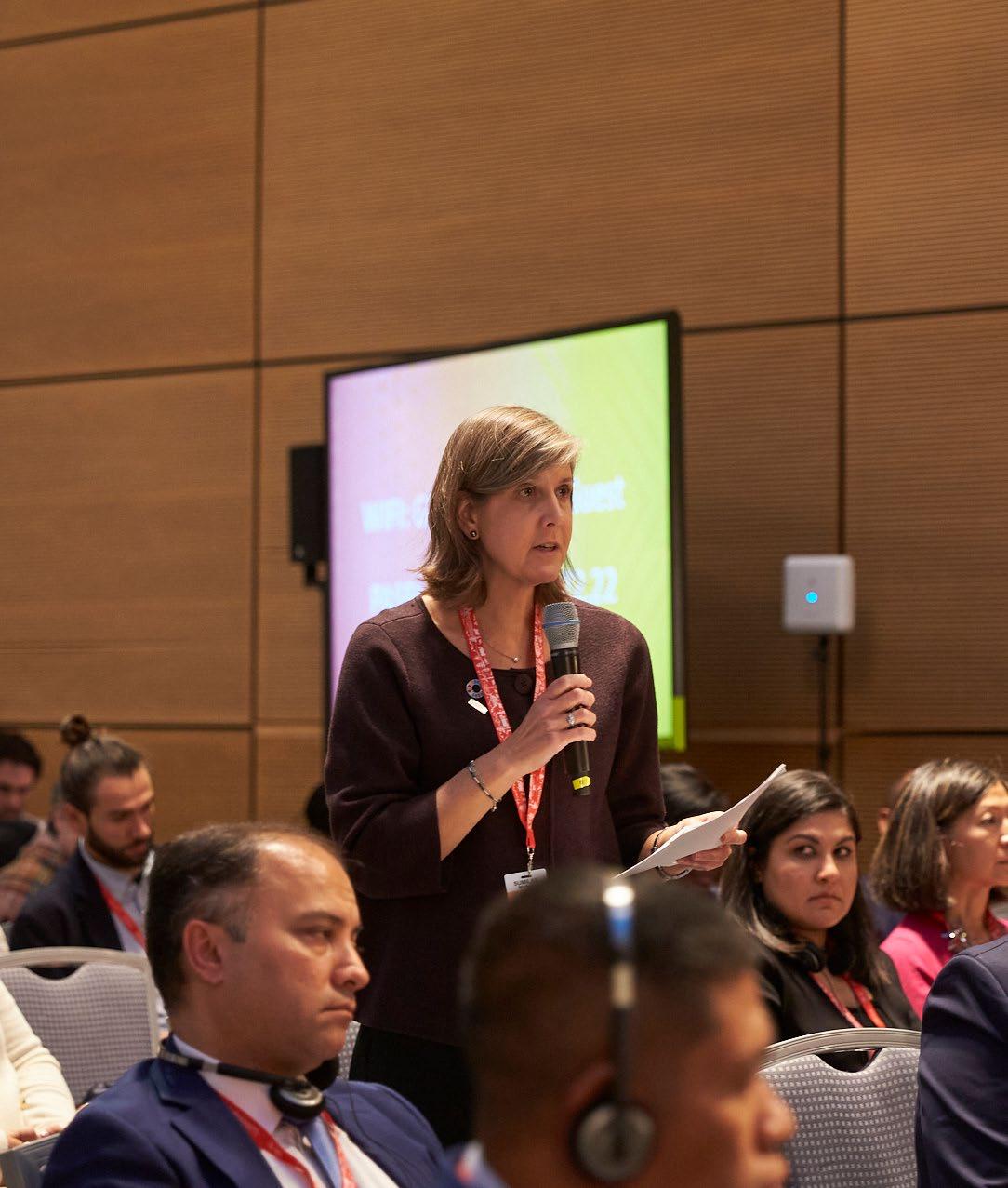
MOPAN after 20
Annual Report 2022 29
USAID’s Michele Sumilas poses a question to the panel at MOPAN’s 20th Anniversary High-Level Event, Geneva,12 December 2022. © MOPAN
Strategic renewal
As the global landscape changes, so must MOPAN. Since the conclusion of the external evaluation of the MOPAN Network 2015-21, the Network has been reflecting on its role helping rebuild trust in the multilateral system. MOPAN members have agreed to develop a vision and strategy to set out how the Network will further strengthen the performance of the multilateral system , better meet members’ and stakeholders’ needs for performance, and drive learning and behaviour change. MOPAN’s new vision is expected to be endorsed by members in May 2023.
Following the agreement of the vision, MOPAN members will work together to develop a medium-term strategy for the Network to take effect in January 2025.
Finally, the Network will update its methodological framework for assessments with the resulting MOPAN 4.0 and use it for assessments from 2025 onwards.
Today, in the face of interconnected global crises, the performance of multilateral organisations is more critical than ever. A stronger, more influential, and more effective MOPAN is a critical tool to build trust and strengthen performance to ensure the multilateral system is fit-for-purpose and able to deliver on the challenges of today and tomorrow.
–Jon Lomøy, Strategy Group Rapporteur, former Director-General Norwegian Agency for Development Cooperation
Strategy Group
MOPAN created a strategy group of senior stakeholders (including senior officials from among MOPAN members, representatives of multilateral organisations and external experts) to provide guidance and recommendations to inform the development of the vision and strategy in 2023. The group first met in December 2022 in the margins of MOPAN’s 20th anniversary high level event.
Strategy Group members
Laura Aghilarre, Deputy Director for DevelopmentCooperation, Italian Ministry of Foreign Affairs, MOPAN Chair 2023
Rwodah Al Naimi, Manager, Strategic Partnerships Department, Qatar Fund for Development
Omar Bargawi, Deputy Director and Head, Development Partnerships and Multilateral Effectiveness Department, FCDO UK
Cécilia de Decker, Special Evaluator of Development Cooperation, Ministry of Foreign Affairs
Bastian de Laat, Head of In-depth Evaluation, OECD
Efraim Gomez, Chief of Staff, UNAIDS
John Hendra, President, JD Hendra StrategicConsulting, former UN Assistant Secretary-General (ASG)
Satu Lassila, Director for the Unit for UN Development and Innovation Issues, Finnish Ministry for Foreign Affairs
Jon Lomøy, Strategy Group Rapporteur, former Director General Norwegian Agency for Development Cooperation
Isabelle Mercier, Director, Evaluations, Global Affairs Canada
Amy Pope, Deputy Director General for Management and Reform, International Organisation for Migration
Mark Singleton, Owner/CEO, Nexus Strategy Consultancy
Michele Sumilas, Assistant to the Administrator of the Bureau for Policy, Planning, and Learning, USAID

Annual Report 2022 MOPAN after 20
MOPAN Strategy Group convenes the first of three meetings to focus on MOPAN’s vision and strategy, Geneva, 12 December 2022.
31 30
© MOPAN
MOPAN 4.0
In 2023, as part of the Network’s strategic renewal, members will work together to design MOPAN 4.0. This revised methodological approach to multilateral assessments will reflect members needs concerning the performance of multilateral organisations and the ability of organisations to work together as a multilateral system. To ensure that MOPAN 4.0 reflects lessons from the current cycle of MOPAN assessments, the Technical Working Group (TWG) will lead a series of reviews and synthesised learning in 2023, including approaches to making assessments more useful and relevant going forward.
MOPAN 4.0 will build on lessons from the past from the two adapted frameworks: one focused on organisations working in crises and a second tailored to international finance institutions. Lessons about whether, how, and why these adaptations support the delivery of useful and credible findings will inform the work to design MOPAN 4.0.
The Network also developed a research plan to better understand member needs, including for due diligence and strategic learning. The TWG will support the Secretariat in completing this research during the coming biennium 2023-24. These activities will ensure that MOPAN continues to play a central role in supporting the multilateral system to be smarter, better, and stronger to meet today’s standards and tomorrow’s challenges.
2023 Key network dates
January
February
May
2nd MOPAN Strategy Group Meeting: Ensuring MOPAN delivers the right performance information at the right time
3rd MOPAN Strategy Group Meeting: Utilising the collective voice of the MOPAN Network
Spring Steering Committee Meeting: Members to agree to MOPAN’s strategic vision
June
November
Membership expansion: Spain to re-join the MOPAN Network as a member
Autumn Steering Committee Meeting: Members to agree to MOPAN’s medium-term strategy
MOPAN assessments
MOPAN will initiate the following assessments in 2023.7
Multilateral Organisation Institutional Lead

7 Assessments agreed by members as at 31 December 2022. More assessments to be confirmed by MOPAN members throughout the 2023-24 biennium.
Annual Report 2022 MOPAN after 20
33 32
Kingdom UN Women Italy, Netherlands AsDB Canada, United States FAO Denmark, Norway GEF Australia, Sweden OHCHR Germany, Spain UN Habitat Italy, Republic of Korea UNESCO Switzerland, United States, Türkiye
UNFPA Finland Switzerland WFP
Qatar, United
(observer)
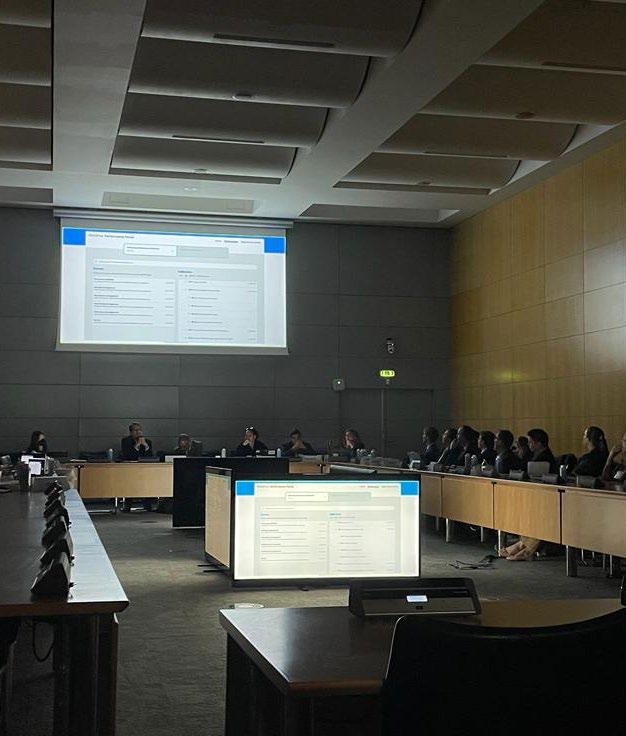
Guiding the MOPAN Network
MOPAN Steering Committee members attend 2022 Autumn Steering Committee, Paris, 20 October 2022. © MOPAN Annual Report 2022 35
Network governance
The Network is led by a Chair who presides over MOPAN’s Steering Committee, its primary decisionmaking body, for a period of one calendar year. The position rotates annually. The Chair is supported by a Bureau comprised of the previous, current, incoming Chairs, Chair of the Technical Working Group and the Head of Secretariat. Technical matters, particularly around the assessment methodology, are referred to MOPAN’s Technical Working Group, which acts in an advisory role. The MOPAN Network is supported by a Secretariat that is hosted at the Organisation for Economic Co-operation and Development in Paris. MOPAN’s hosting arrangement is set out in the 2020-22 Memorandum of Understanding and has been extended until 31 December 2024.
MOPAN Chair
• Chairs Steering Committee and Bureau
• Holds position for one fixed calendar year
• Rotates among MOPAN members
Mr Christian Frutiger, 2022 MOPAN Chair
Assistant Director General, Head of Global Cooperation Swiss Agency for Development and Cooperation and Federal Department of Foreign Affairs (FDFA), Switzerland
The Bureau
• Facilitates decision-making between Steering Committee meetings
• Supports the Chair and drives the Network’s strategic direction
• Composed of the current former, and incoming MOPAN Chair, Head of the Secretariat and the chairs of active working groups
2022 Bureau Chair: Switzerland
Previous 2021 Chair: Canada
Forthcoming 2023 Chair: Italy
Technical Working Group Chair: Belgium Head of Secretariat
• MOPAN’s decision-making body
• Composed of one representative for each MOPAN member
• Meets bi-annually
Members
Australia, Belgium, Canada, Denmark, Finland, France, Germany, Ireland, Italy, Japan, Korea, Luxembourg, the Netherlands, Norway, Qatar, Sweden, Switzerland, the United Kingdom, and the United States. *
*Türkiye is an observer
Technical Working Group
• Steering Committee subsidiary body acting in an advisory capacity
• Focuses on the development and application of the MOPAN approach and methodology
• Identifies emerging methodological and technical issues, presents recommendations to be approved by the Steering Committee
Ms Cécilia De Decker, 2022 TWG Chair
Special Evaluator, Development Cooperation, Ministry of Foreign Affairs, Belgium Steering Committee
Secretariat
• Led by the Head of the MOPAN Secretariat
• Operates under the strategic guidance of the Steering Committee
• Implements MOPAN’s Programme of Work and Budget
Ms Suzanne Steensen, Head of MOPAN Secretariat
Annual Report 2022 Guiding the MOPAN Network 36
37 36
Membership
Members Institutional Leads
¨ MOPAN members are responsible shareholders and funders of the multilateral system. They play a decisive role in defining the Network’s strategic direction, operational delivery and internal governance, and support peer learning.
¨ Members approve MOPAN’s vision, strategy and programme of work, lead and support assessments and knowledge products, and use MOPAN’s performance information and collective voice to improve standards and effectiveness across the multilateral system.
¨ Members are given privileged access to assessment findings before they are made public.
¨ Members benefit from MOPAN’s whole-of-government approach. They receive performance information on several organisations and engage with stakeholders from across government administrations, including ministries of foreign affairs, ministries of finance and ministries of development.
¨ Members fund the operations of the Secretariat in equal shares.
Observers
¨ States interested in joining MOPAN may become observers at no financial cost for a period of one year during which time they can better understand how MOPAN can support their multilateral strategies, policy dialogues, and accountability needs. The MOPAN Chair welcomes enquiries about becoming an observer.
¨ Institutional Leads are MOPAN members who champion specific MOPAN assessments on behalf of the Network. All MOPAN members have a responsibility to act as Institutional Leads and to influence the changes that organisations make in response to MOPAN assessments. The contribution of Institutional Leads is essential to:
• Provide key political support for the assessment for greater impact,
• ensure that assessments are relevant, critical and helpful to the organisations and MOPAN members; and
• ensure that the evidence from assessments promotes behaviour change, by disseminating the results within their administrations and with peers, engaging with the organisations on the management response process and following-up on MOPAN’s recommendations within multilateral governance structures.
Reference Group
¨ MOPAN convenes reference groups to support the delivery of its knowledge products. These groups comprise high-level experts from across MOPAN members and other relevant stakeholders interested in supporting the implementation of MOPAN’s thematic studies, “Lessons in Multilateral Effectiveness”. Participants contribute by:
• Providing strategic guidance and technical expertise,
• ensuring that MOPAN’s findings are robust and relevant, and by
• disseminating studies within their administrations and broadly to stakeholders across the multilateral system.
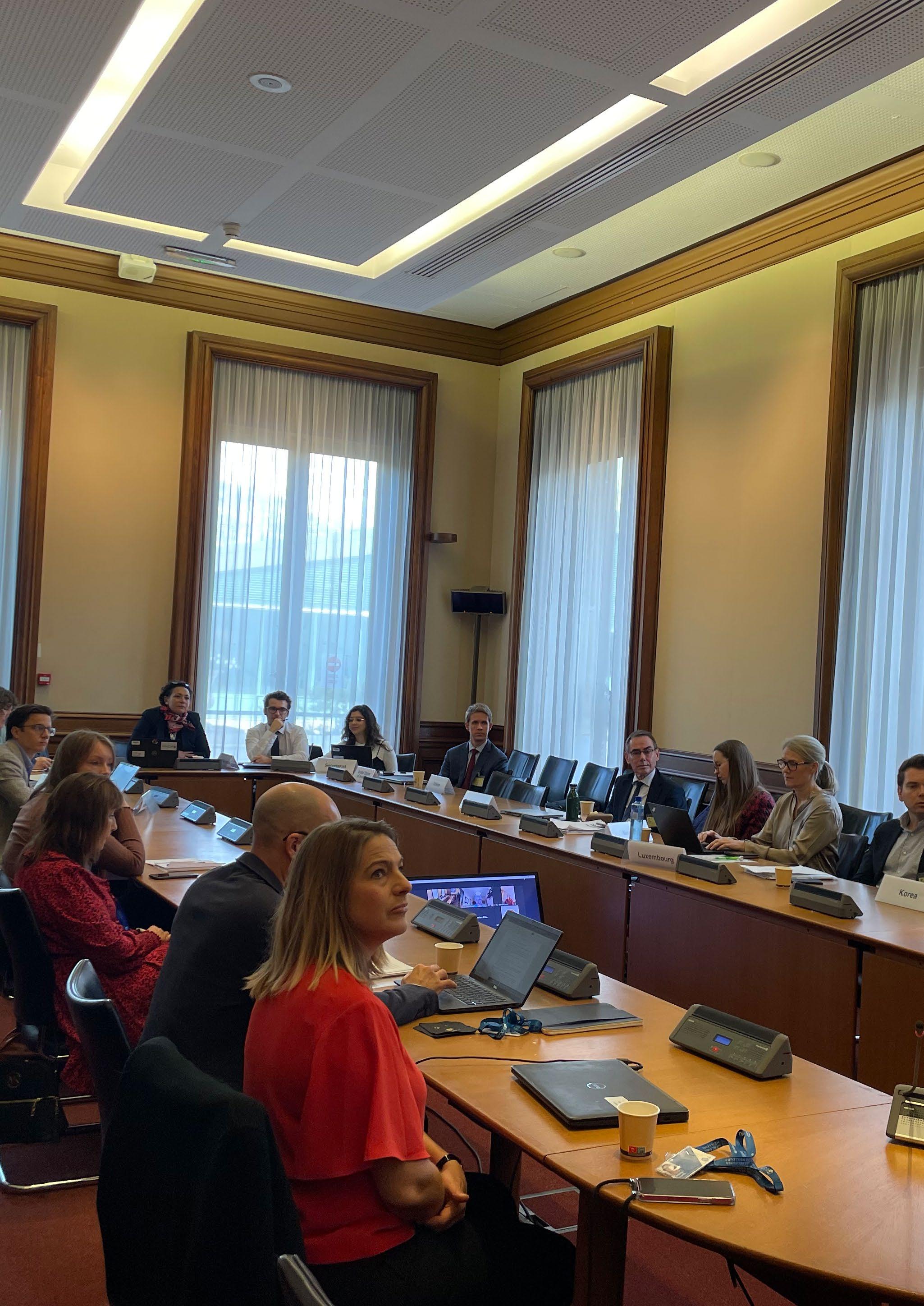
Annexes
MOPAN Steering Committee members attend MOPAN Learning Event, “Member Uses of MOPAN: Sharing Best Practices and Harnessing New Opportunities”, Paris, 21 October 2022.
© MOPAN
Annual Report 2022
38
Annex A: Finances
2022 Statement of Income —Membership
MOPAN Programme Costs – 2022 Statement of Expenditure
Note: The MOPAN MOU renewal was formally approved in June 2019 by OECD Council [C(2019)82], and covers three years 2020-2022.
1) The “Carry-forward from 2021 to 2022” corresponds to the balance between actual reported income received by the Network as at 31.12.2021 (EUR 6 486 623) minus actual reported expenditure from 2021 (EUR 3 593 957).
2) Accepted contributions are firm offers which have undergone the formal process of acceptance by the OECD Budget Committee and formalised through individual grant agreements. A contribution is considered “accepted” at the end of this process regardless of the agreed dates of payment or reception of payments; however, amounts reported herewith correspond to amounts received by year.
3) France, Ireland, Norway, Switzerland and The United States of America have paid their (2020-2022) membership contributions in previous years
4) Luxemburg has paid EUR 342 000 (including a VC of EUR 100 000) in year II (2021) & has paid EUR 242 000 in year III (2022).
Note: The budget for 2022 is based on the approved 2022 budget by the MOPAN Steering Committee as provided in MOPAN/SC(2021)11
1) The expenditure for 2022 cover costs from 1 January until 31 December 2022 and include the running costs of the Secretariat (Headings A&B) and the cost recovery charges for all accepted voluntary contributions in 2022 (Heading C).
2) The staff & related costs include salaries, contribution to the indemnities and benefits fund, and per person charge back which comprises office space costs, and other direct costs generated by staff working on voluntary contribution (VC) funded projects. The amount is charged on a pro-rata ad temporis basis. For further explanation see BC(2021)10.
3) The MOPAN Assessment Consultancy fees include the costs related to the finalisation of 2021 assessment cycle as well as the costs related to the 2022 assessments and analytical studies. The variance is due to delayed payments of the 2022 assessment deliverables which will occur in 2023.
4) The expenditures related to “Other Intellectual Services” were lower than the budgeted amount. It is mainly due to delayed payments for the editing and design of assessments and the postponement of the TWG and data hub work.
5) The overall missions’ costs were lower than the budgeted amount given delays in the liquidation of the missions undertaken in 2022, combined with several missions being postponed to 2023.
6) The deviation related to operating expenses is due to increased charges for IT equipments and softwares.
7) As per the OECD’s voluntary contributions (VC) cost recovery policy [C(2009)158; C(2021)73], the charge is currently set at 6.3%. The deviation is due to Qatar joining the network as a member in 2022.
Annual Report 2022 Annexes
Overall MOPAN Income (in Euros) as at 31.12.2022 A. Carry forward from previous year Total available carry-forward from 2021 to 20221 2 892 666 B. Accepted voluntary contributions2 Actual Income 2022 Australia 198 000 Belgium 198 000 Canada 198 000 Denmark 198 000 Finland 198 000 France3Germany 198 000 Ireland3Italy 198 000 Japan 198 000 Korea 198 000 Luxemburg4 242 000 Netherlands 198 000 Norway3Sweden 198 000 Switzerland3UK 198 000 USA3Qatar 198 000 TOTAL 2 816 000 GRAND TOTAL (A+B) 5 708 666
MOPAN Programme costs - Expenditure Analysis1 for 2022 as at 31.12.2022 (in Euros) Budget (2022) Total Actual A. 2022 Secretariat staff and related costs2 1 979 317 1,985,025 B. 2021 Non-staff costs MOPAN Assessment Consultancy3 2 604 312 774 097 Other Intellectual Services4 457 325 187 727 Missions/Travel5 130 000 8 113 Operating expenses6 42 578 71 267 SUBTOTAL B: Non-staff costs 3 234 215 1 041 204
Cost recovery charge for voluntary contributions7 - 12 474 TOTAL (A+B+C+D) 5 213 532 3 038 703
C.
41 40
Annex B: MOPAN assessments 2003-2023
8 The dates listed in this table refer to the year that assessments were agreed by MOPAN members and the assessed organisation. This table does not reflect dates of delivery of institutional assessments.
9 Assessments have been conducted using five versions of the evolving MOPAN assessment methodology: Annual Surveys the Common Approach, MOPAN 3.0, MOPAN 3.0*, and MOPAN 3.1. MOPAN’s current methodology has been applied to all assessments initiated since 2020.
Annual Report 2022 Annexes MOPAN Assessments 2003-23 8,9 Annual Surveys Common Approach MOPAN 3.0 MOPAN 3.0* MOPAN 3.1 2003 2004 2005 2006 2007 2008 2009 2010 2011 2012 2013 2014 2015/16 2017/18 2019 2020 2021 2022 2023 ADB • • • • • • AfDB • • • • • • • CGIAR • EC • EBRD • FAO • • • • • GAVI • • • GEF • • GLOBAL FUND • • GPE • • IDB • • • • IFAD • • • • IFC • ILO • • • IOM • • MLF • OCHA • • OHCHR • • UN HABITAT • • UN WOMEN • • • UNAIDS • • • • UNCTAD • UNDP • • • • • • UNEP • • • UNESCO • • UNFPA • • • • • • UNHCR • • • • UNICEF • • • • • UNIDO • UNODC • UNOPS • UNRWA • • • WFP • • • WHO • • • • • • WBG • • • • • • •
43 42

For comments or queries, please contact:
secretariat@mopanonline.org
www.mopanonline.org
Annual Report 2022 45

www.mopanonline.org
secretariat@mopanonline.org
@MOPANnetwork
MOPAN - Multilateral Organisation Performance Assessment Network
2, rue André Pascal 75775 Paris, France Cedex 16
© MOPAN 2022





























































